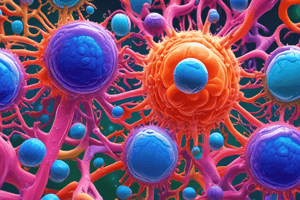Podcast
Questions and Answers
What are eukaryotes that are neither plants, animals, nor fungi called?
What are eukaryotes that are neither plants, animals, nor fungi called?
- Protists (correct)
- Viruses
- Bacteria
- Archaea
Which group of protists includes diatoms and brown algae?
Which group of protists includes diatoms and brown algae?
- Rhizaria
- Chromalveolata (correct)
- Excavata
- Amoebozoa
What structure do brown algae have to attach to hard bottoms?
What structure do brown algae have to attach to hard bottoms?
- Flagellum
- Holdfast (correct)
- Pseudopods
- Blades
Which protists produce 1/5 of the oxygen on Earth?
Which protists produce 1/5 of the oxygen on Earth?
What distinguishes forams among protists?
What distinguishes forams among protists?
Which protists change their shape using pseudopods?
Which protists change their shape using pseudopods?
Flashcards are hidden until you start studying
Study Notes
Protists
- Eukaryotes that are neither plants, animals, nor fungi are called protists.
Protist Groupings
- Diatoms and brown algae are classified as stramenopiles.
Brown Algae Characteristics
- Brown algae have holdfasts, which are structures that attach them to hard bottoms.
Oxygen Producers
- Phytoplankton, a type of protist, produce 1/5 of the oxygen on Earth.
Foraminifera (Forams)
- Forams are distinguished by their shells, which are made of calcium carbonate.
Amoeboid Protists
- Amoebas are protists that change their shape using pseudopods.
Studying That Suits You
Use AI to generate personalized quizzes and flashcards to suit your learning preferences.




